Jakov (Serbian: Јаков) was the Serbian Archbishop from 1286 to 1292. Information on Jakov is scarce; it is known that he renovated and founded churches and that he likely transferred the episcopal see from Žiča to the Peć metochion. He had special love for the Studenica monastery, to which he provided liturgical books and church accessories. He had special care for Serbian ascetics. He received his aureola with his saintly purity and Christian love, he was gentle, humble and charitable. The Serbian Orthodox Church venerates him as Saint Jakov on February 3, in the Church calendar, while February 16, on the Gregorian calendar.
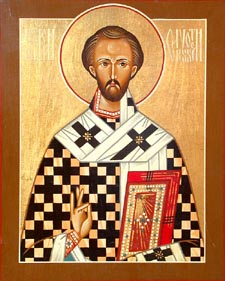 Saint John Chrysostom This great ecumenical teacher and hierarch died in the city of Comana in the year 407 on his way to a place of exile. He had been condemned by the intrigues of the empress Eudoxia because of his daring denunciation of the vices of those ruling over Constantinople. The transfer of his venerable relics was made in the year 438, thirty years after the death of the saint during the reign of Eudoxia’s son emperor Theodosius II (408-450).
Saint John Chrysostom This great ecumenical teacher and hierarch died in the city of Comana in the year 407 on his way to a place of exile. He had been condemned by the intrigues of the empress Eudoxia because of his daring denunciation of the vices of those ruling over Constantinople. The transfer of his venerable relics was made in the year 438, thirty years after the death of the saint during the reign of Eudoxia’s son emperor Theodosius II (408-450).
Saint John Chrysostom had the warm love and deep respect of the people, and grief over his untimely death lived on in the hearts of Christians. Saint John’s disciple, Saint Proclus, Patriarch of Constantinople (434-447), during services in the Church of Hagia Sophia, preached a sermon praising Saint John. He said, “O John, your life was filled with sorrow, but your death was glorious. Your grave is blessed and reward is great, by the grace and mercy of our Lord Jesus Christ O graced one, having conquered the bounds of time and place! Love has conquered space, unforgetting memory has annihilated the limits, and place does not hinder the miracles of the saint.”
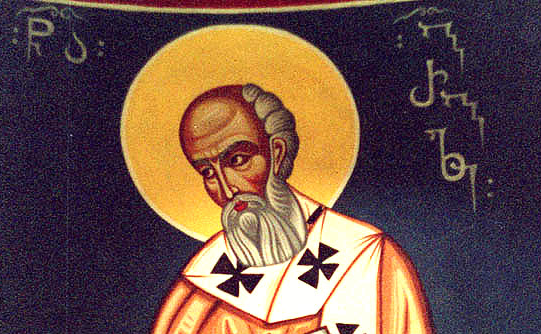 Saint Gregory the Theologian, Archbishop of Constantinople, a great Father and teacher of the Church, was born into a Christian family of eminent lineage in the year 329, at Arianzos (not far from the city of Cappadocian Nazianzos). His father, also named Gregory (January 1), was Bishop of Nazianzus. The son is the Saint Gregory Nazianzus encountered in Patristic theology. His pious mother, Saint Nonna (August 5), prayed to God for a son, vowing to dedicate him to the Lord. Her prayer was answered, and she named her child Gregory.
Saint Gregory the Theologian, Archbishop of Constantinople, a great Father and teacher of the Church, was born into a Christian family of eminent lineage in the year 329, at Arianzos (not far from the city of Cappadocian Nazianzos). His father, also named Gregory (January 1), was Bishop of Nazianzus. The son is the Saint Gregory Nazianzus encountered in Patristic theology. His pious mother, Saint Nonna (August 5), prayed to God for a son, vowing to dedicate him to the Lord. Her prayer was answered, and she named her child Gregory.
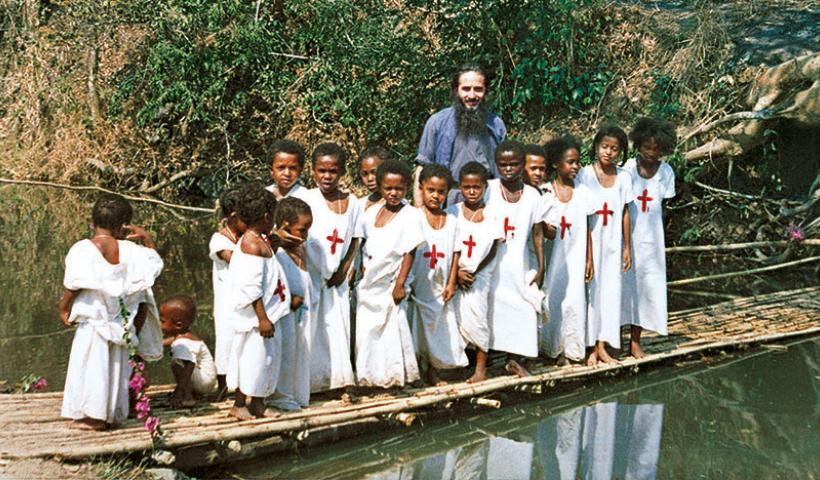 In remembrance of archimandrite Kosmas (Aslanidis), the apostle of the Republic of Zaire
In remembrance of archimandrite Kosmas (Aslanidis), the apostle of the Republic of Zaire
Go ye therefore, and teach all nations, baptizing them in the name of the Father, and of the Son, and of the Holy Ghost: Teaching them to observe all things whatsoever I have commanded you: and, lo, I am with you always, even unto the end of the world. Amen (Mt. 28:19–20). Such was the final commandment our Savior gave to His apostles. Every true Christian is a missionary that testifies that the Kingdom of God has come into the world and spreads the good news about it to other people.
Hieromonk Kosmas Grigoriatis (Ioannis Aslanidis in the world; 1942-1989) is one of the most well-known Orthodox missionaries of our time, through whom the light of Christ has illumined the souls of many of our African brothers and sisters in Christ. This year we commemorate the thirtieth anniversary of his reposal.
We would like to offer our readers a few words of reminiscence in honor of Fr. Kosmas, which were said by the abbot of the Grigoriat monastery of Mt. Athos—geronda George (Kapsanis) of blessed memory.
After sunset on Friday, January 7, 1989, the zealous preacher of the Gospel to our African brothers, hieromonk Kosmas, faded away from this life in order to arise in the ever-shining light of the Kingdom of God. On his way from Lubumbashi to Kolwezi, he suddenly finished his earthly journey, and stepped upon the path leading to eternity, to the everlasting City, to the longed-for Homeland.
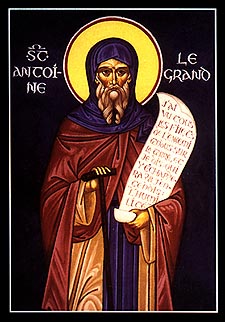 Saint Anthony the Great is known as the Father of monasticism, and the long ascetical sermon in The Life of Saint Anthony by Saint Athanasius (Sections 16-34), could be called the first monastic Rule.
Saint Anthony the Great is known as the Father of monasticism, and the long ascetical sermon in The Life of Saint Anthony by Saint Athanasius (Sections 16-34), could be called the first monastic Rule.
He was born in Egypt in the village of Coma, near the desert of the Thebaid, in the year 251. His parents were pious Christians of illustrious lineage. Anthony was a serious child and was respectful and obedient to his parents. He loved to attend church services, and he listened to the Holy Scripture so attentively, that he remembered what he heard all his life.
When Saint Anthony was about twenty years old, he lost his parents, but he was responsible for the care of his younger sister. Going to church about six months later, the youth reflected on how the faithful,in the Acts of the Apostles (4:35), sold their possessions and gave the proceeds to the Apostles for the needy.
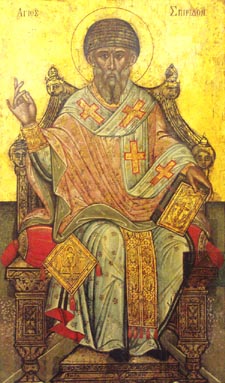 Saint Spyridon of Tremithus was born towards the end of the third century on the island of Cyprus. He was a shepherd, and had a wife and children. He used all his substance for the needs of his neighbors and the homeless, for which the Lord rewarded him with a gift of wonderworking. He healed those who were incurably sick, and cast out demons.
Saint Spyridon of Tremithus was born towards the end of the third century on the island of Cyprus. He was a shepherd, and had a wife and children. He used all his substance for the needs of his neighbors and the homeless, for which the Lord rewarded him with a gift of wonderworking. He healed those who were incurably sick, and cast out demons.
After the death of his wife, during the reign of Constantine the Great (306-337), he was made Bishop of Tremithus, Cyprus. As a bishop, the saint did not alter his manner of life, but combined pastoral service with deeds of charity.
According to the witness of Church historians, Saint Spyridon participated in the sessions of the First Ecumenical Council in the year 325. At the Council, the saint entered into a dispute with a Greek philosopher who was defending the Arian heresy. The power of Saint Spyridon’s plain, direct speech showed everyone the importance of human wisdom before God’s Wisdom: “Listen, philosopher, to what I tell you. There is one God Who created man from dust. He has ordered all things, both visible and invisible, by His Word and His Spirit. The Word is the Son of God, Who came down upon the earth on account of our sins. He was born of a Virgin, He lived among men, and suffered and died for our salvation, and then He arose from the dead, and He has resurrected the human race with Him. We believe that He is one in essence (consubstantial) with the Father, and equal to Him in authority and honor. We believe this without any sly rationalizations, for it is impossible to grasp this mystery by human reason.”

 Saint John Chrysostom This great ecumenical teacher and hierarch died in the city of Comana in the year 407 on his way to a place of exile. He had been condemned by the intrigues of the empress Eudoxia because of his daring denunciation of the vices of those ruling over Constantinople. The transfer of his venerable relics was made in the year 438, thirty years after the death of the saint during the reign of Eudoxia’s son emperor Theodosius II (408-450).
Saint John Chrysostom This great ecumenical teacher and hierarch died in the city of Comana in the year 407 on his way to a place of exile. He had been condemned by the intrigues of the empress Eudoxia because of his daring denunciation of the vices of those ruling over Constantinople. The transfer of his venerable relics was made in the year 438, thirty years after the death of the saint during the reign of Eudoxia’s son emperor Theodosius II (408-450). Saint Gregory the Theologian, Archbishop of Constantinople, a great Father
Saint Gregory the Theologian, Archbishop of Constantinople, a great Father  In remembrance of archimandrite Kosmas (Aslanidis), the apostle of the Republic of Zaire
In remembrance of archimandrite Kosmas (Aslanidis), the apostle of the Republic of Zaire Saint Anthony the Great is known as the Father of monasticism, and the long ascetical sermon in The Life of Saint Anthony by Saint Athanasius (Sections 16-34), could be called the first monastic Rule.
Saint Anthony the Great is known as the Father of monasticism, and the long ascetical sermon in The Life of Saint Anthony by Saint Athanasius (Sections 16-34), could be called the first monastic Rule. Saint Spyridon of Tremithus was born towards the end of the third century on the island of Cyprus. He was a shepherd, and had a wife and children. He used all his substance for the needs of his neighbors and the homeless, for which the Lord rewarded him with a gift of wonderworking. He healed those who were incurably sick, and cast out demons.
Saint Spyridon of Tremithus was born towards the end of the third century on the island of Cyprus. He was a shepherd, and had a wife and children. He used all his substance for the needs of his neighbors and the homeless, for which the Lord rewarded him with a gift of wonderworking. He healed those who were incurably sick, and cast out demons.